The Sacramento Raging Grannies lead a sing-along at the September 2018 Western Cluster Meeting. All meeting photos were taken by Cherill Spencer.
By Cherrill Spencer
Peninsula/Palo Alto Branch and September 2018 Western Cluster Meeting attendee.
Every year the WILPF branches in northern California get together for a day-long meeting to learn from one another and spend time with other WILPFers whom we would otherwise only hear talking on ONE WILPF calls or know by email.
This year’s so-called Western Cluster meeting took place in downtown Sacramento on September 29, kindly hosted by the Sacramento branch. About 30 WILPFers from these eight California branches attended the meeting: East Bay/Berkeley, Fresno, Monterey, Peninsula/Palo Alto, Sacramento, San Francisco, San Jose, and Santa Cruz. We met in the community room of the Southside Co-Housing community, which will celebrate their 25th anniversary in October. Pennie Taylor of the Sacramento branch emceed the meeting and kept us to time as we heard about five main topics.
The first main agenda item was a presentation about Public Banks by Randa Solick of the Santa Cruz branch. A public bank is chartered and owned by the city, county, or state who founded it and its customers are institutions (e.g. state pension funds), as a public bank is not a retail bank that provides services for individuals. A public bank loans money at very low interest rates to help fund to a variety of municipal, county, or state needs such as public infrastructure and housing for low-income residents, instead of the profits being given to shareholders as happens with a “private,” commercial, “Wall Street” bank (e.g., Wells Fargo, Bank of America).
One likely customer of a public bank that would be set up in Los Angeles, if the measure on the November 6th ballot about this passes and some state and federal laws are revised, would be the businesses legally selling cannabis! In fact, the push to create public banks now in many cities and states is because money from cannabis sales is currently stored in warehouses or elsewhere as these businesses are not allowed to deposit money into regular banks because selling cannabis is illegal under federal law (see what you can learn at WILPF meetings!). Here is a website where you can learn more about public banks: www.publicbankinginstitute.org.
Ellen Schwartz (Sacramento Branch) provided us with news about WILPF US and advice for keeping connected to and helping WILPF national, for example taking part in the weekly TWITTER storms, and running for one of the open positions on the national board.
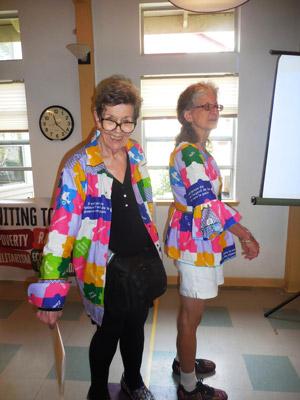 Five women at this Western Cluster meeting had attended the 32nd International Triennial WILPF Congress in Accra, Ghana, last August and we were treated to five different perspectives on this important Congress including the clothes one could buy using special cloth that participants from one of the African countries had brought (see photo of Barbara Nielsen and Darien Lu with their WILPF blouses). We heard and saw many colorful photos from Barbara Nielsen (San Francisco branch; revised international constitution, international progamme); Jan Slagter (Fresno branch; Africa Feminist Peace conference and general overview); Darien De Lu (Sacramento branch; major issues in Africa sections); Jane Doyle (Santa Cruz branch; historical perspective on WILPF’s stand against war and how that plays out in Africa); and Barby Ulmer (San Jose branch; history and source of the slave trade, working against gender-based violence). Lots of questions were asked about the Congress by those who had not attended. More detailed reports from the US delegation to this congress will be forthcoming in other publications and our international website is another source for international congress news. Tune into the October 11 ONE WILPF Call that will feature reports from our delegates to the International Congress.
Five women at this Western Cluster meeting had attended the 32nd International Triennial WILPF Congress in Accra, Ghana, last August and we were treated to five different perspectives on this important Congress including the clothes one could buy using special cloth that participants from one of the African countries had brought (see photo of Barbara Nielsen and Darien Lu with their WILPF blouses). We heard and saw many colorful photos from Barbara Nielsen (San Francisco branch; revised international constitution, international progamme); Jan Slagter (Fresno branch; Africa Feminist Peace conference and general overview); Darien De Lu (Sacramento branch; major issues in Africa sections); Jane Doyle (Santa Cruz branch; historical perspective on WILPF’s stand against war and how that plays out in Africa); and Barby Ulmer (San Jose branch; history and source of the slave trade, working against gender-based violence). Lots of questions were asked about the Congress by those who had not attended. More detailed reports from the US delegation to this congress will be forthcoming in other publications and our international website is another source for international congress news. Tune into the October 11 ONE WILPF Call that will feature reports from our delegates to the International Congress.
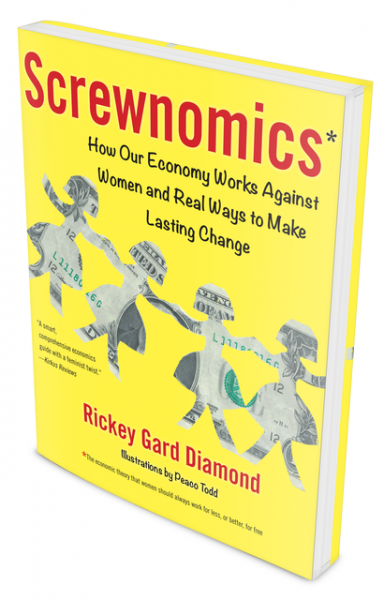 After a rousing set of songs led by the Sacramento Raging Grannies and a tasty lunch provided by the Zest Vegan Kitchen, the cluster meeting moved onto the other two main topics on the agenda: watching a video on the book Screwnomics by Rickey Gard Diamond. Then a discussion was led by Ellen Schwartz (Sacramento Branch) who explained that the book and its associated workbook show how our economy works against women and the real ways to make lasting change (see www.screwnomics.org for more details).
After a rousing set of songs led by the Sacramento Raging Grannies and a tasty lunch provided by the Zest Vegan Kitchen, the cluster meeting moved onto the other two main topics on the agenda: watching a video on the book Screwnomics by Rickey Gard Diamond. Then a discussion was led by Ellen Schwartz (Sacramento Branch) who explained that the book and its associated workbook show how our economy works against women and the real ways to make lasting change (see www.screwnomics.org for more details).
The fifth and final main item on the agenda was the “Branch Programs Sharing” and all eight branches reported on their activities and the general health and operations of their branch since the previous cluster meeting in February 2017. These reports described the solidarity events branches had participated in (e.g., Earth Day in 2017; Hiroshima Day in 2018); their activities for the Poor People’s Campaign (during the 40 Days of Action and currently); the issues they focus on (e.g., low-income housing and banning nuclear weapons); their efforts to recruit new members, and using the web and social media to publicize their activities and WILPF’s goals.
Many thanks to the WILPF Sacramento branch for hosting this Western Cluster meeting and to the members who suffered extensive traffic jams and drove hundreds of miles to attend! It was a most interesting and worthwhile meeting.
For more information, contact Cherrill Spencer at cherrill.m.spencer@gmail.com.

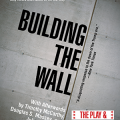
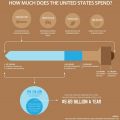
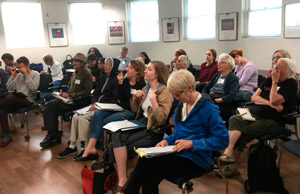 ANA’s big event is the spring DC Days, which provide teaching and lobbying days and scholarships to youth. Carol Urner, former co-chair of WILPF-US DISARM/End Wars Issue Committee, fully participated in ANA for many years, as has current co-chair Ellen Thomas. I was brought to DC days the first time by Kay Cumbow, who received an award there for her work on monitoring nuclear waste in the Great Lakes, and I attended again in 2017 with Ellen.
ANA’s big event is the spring DC Days, which provide teaching and lobbying days and scholarships to youth. Carol Urner, former co-chair of WILPF-US DISARM/End Wars Issue Committee, fully participated in ANA for many years, as has current co-chair Ellen Thomas. I was brought to DC days the first time by Kay Cumbow, who received an award there for her work on monitoring nuclear waste in the Great Lakes, and I attended again in 2017 with Ellen.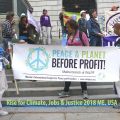

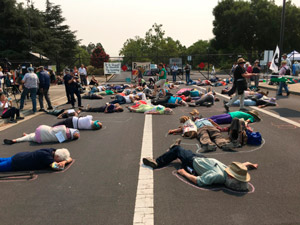 I participated in the August 6 actions at Lawrence Livermore National Laboratory in Livermore, CA, with Marylia Kelley of Tri-Valley CARES and WILPF Life Member Jackie Cabasso of Western States Legal Foundation, with many others, including East Bay branch members Anne Henney, Annie Boddum, and Sandy Thacker and Sandy's husband Ed Williger, and Barbara Blong of our San Francisco branch. We were later joined by Cappy Israel of the Santa Cruz branch who had driven up herself.
I participated in the August 6 actions at Lawrence Livermore National Laboratory in Livermore, CA, with Marylia Kelley of Tri-Valley CARES and WILPF Life Member Jackie Cabasso of Western States Legal Foundation, with many others, including East Bay branch members Anne Henney, Annie Boddum, and Sandy Thacker and Sandy's husband Ed Williger, and Barbara Blong of our San Francisco branch. We were later joined by Cappy Israel of the Santa Cruz branch who had driven up herself.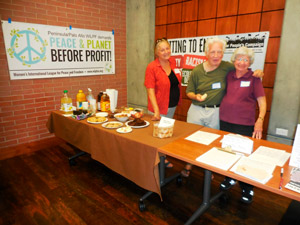 Our Peninsula-Palo Alto WILPF branch held a 6th August evening event at a local library meeting room. We showed the film Atomic Homefront to the 34 people who attended.
Our Peninsula-Palo Alto WILPF branch held a 6th August evening event at a local library meeting room. We showed the film Atomic Homefront to the 34 people who attended.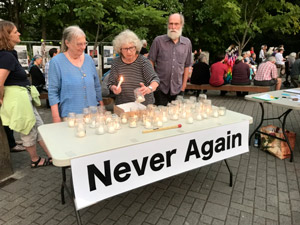 We had a really great event here. We held an outdoor ceremony just next to the Willamette River. We started with people milling around, looking at the informational panels, folding cranes, and listening to cello and guitar music.
We had a really great event here. We held an outdoor ceremony just next to the Willamette River. We started with people milling around, looking at the informational panels, folding cranes, and listening to cello and guitar music. 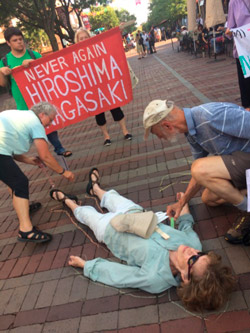 Here is WILPF member Max Vose, offering herself as a silhouette as part of our shadow chalking on Church St., Burlington, during our walk to the water and the floating of candleboats.
Here is WILPF member Max Vose, offering herself as a silhouette as part of our shadow chalking on Church St., Burlington, during our walk to the water and the floating of candleboats. 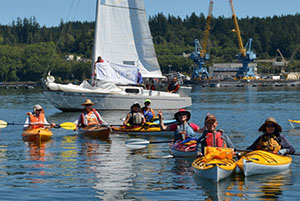 We held the fourteenth annual Peace Fleet, a water-based nonviolent protest against the glorification of weapons of war at the Seattle Seafair festival. Activists in sailboats, motor boats and kayaks met the US Navy fleet in Elliott Bay, while other activists held a simultaneous nonviolent protest at Pier 66 overlooking Elliott Bay.
We held the fourteenth annual Peace Fleet, a water-based nonviolent protest against the glorification of weapons of war at the Seattle Seafair festival. Activists in sailboats, motor boats and kayaks met the US Navy fleet in Elliott Bay, while other activists held a simultaneous nonviolent protest at Pier 66 overlooking Elliott Bay.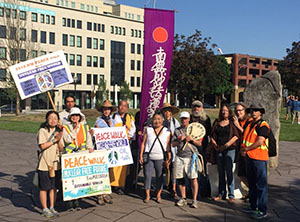 Monks from the Nipponzan Myohoji Buddhist Temple on Bainbridge Island led their annual interfaith peace walk, beginning in Eugene, Oregon, and arriving at Ground Zero Center for the weekend of remembrance of the atomic bombings. The theme of this year’s walk was “No More War – A World Without Nuclear Weapons.” Participants stopped in cities along the way, listening, and sharing the voices of the victims of warfare. This was the fourteenth year of the August Peace Walk.
Monks from the Nipponzan Myohoji Buddhist Temple on Bainbridge Island led their annual interfaith peace walk, beginning in Eugene, Oregon, and arriving at Ground Zero Center for the weekend of remembrance of the atomic bombings. The theme of this year’s walk was “No More War – A World Without Nuclear Weapons.” Participants stopped in cities along the way, listening, and sharing the voices of the victims of warfare. This was the fourteenth year of the August Peace Walk.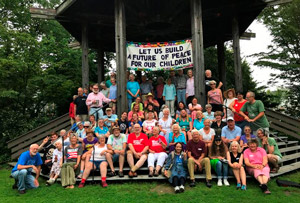 August 4, 2018, marked the day of the 14th year of the Greater Brunswick (ME) Peace Fair. This year's theme was "Imagine a World Without Nuclear Weapons.". The opening ceremony included a dramatic reading of excerpts from the novel Sadako and the Thousand Paper Cranes to mark the 73rd anniversary of the bombing of Hiroshima and Nagasaki.
August 4, 2018, marked the day of the 14th year of the Greater Brunswick (ME) Peace Fair. This year's theme was "Imagine a World Without Nuclear Weapons.". The opening ceremony included a dramatic reading of excerpts from the novel Sadako and the Thousand Paper Cranes to mark the 73rd anniversary of the bombing of Hiroshima and Nagasaki. 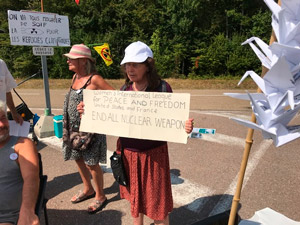 For Hiroshima Day I was in Valduc (the French Centre for Nuclear Studies and research) where they are making parts for nuclear missiles. At the event, there were 100 people surrounded by the police, people from Movement la Paix, ICAN, a die-in was covered by media from the local press. I also did a three-day fast.
For Hiroshima Day I was in Valduc (the French Centre for Nuclear Studies and research) where they are making parts for nuclear missiles. At the event, there were 100 people surrounded by the police, people from Movement la Paix, ICAN, a die-in was covered by media from the local press. I also did a three-day fast.
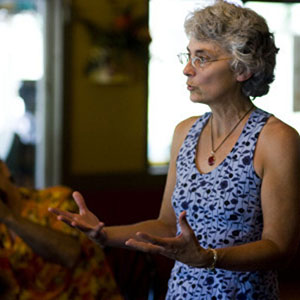 Riki’s father was a toxicologist who sued the state of Connecticut in the 1950s for their unannounced spraying of DDT in heavily populated areas and suburbs. Riki says that case would never even be allowed to come to trial today, because of the unfettered power of corporations to bend the law and steal the Constitutional Rights that were intended for human persons, not ‘corporate persons.’
Riki’s father was a toxicologist who sued the state of Connecticut in the 1950s for their unannounced spraying of DDT in heavily populated areas and suburbs. Riki says that case would never even be allowed to come to trial today, because of the unfettered power of corporations to bend the law and steal the Constitutional Rights that were intended for human persons, not ‘corporate persons.’ 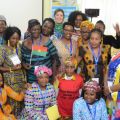

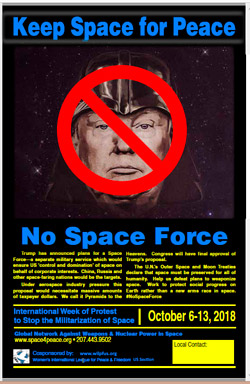 Keep Space for Peace Week
Keep Space for Peace Week 


